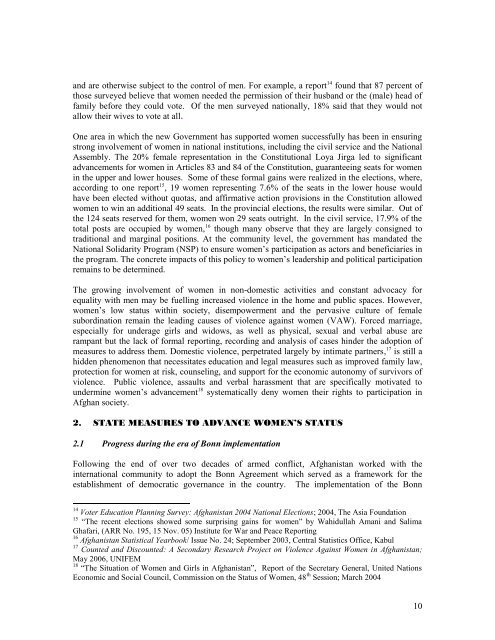National Action Plan for the Women of Afghanistan - The Secretary ...
National Action Plan for the Women of Afghanistan - The Secretary ...
National Action Plan for the Women of Afghanistan - The Secretary ...
- No tags were found...
You also want an ePaper? Increase the reach of your titles
YUMPU automatically turns print PDFs into web optimized ePapers that Google loves.
and are o<strong>the</strong>rwise subject to <strong>the</strong> control <strong>of</strong> men. For example, a report 14 found that 87 percent <strong>of</strong><br />
those surveyed believe that women needed <strong>the</strong> permission <strong>of</strong> <strong>the</strong>ir husband or <strong>the</strong> (male) head <strong>of</strong><br />
family be<strong>for</strong>e <strong>the</strong>y could vote. Of <strong>the</strong> men surveyed nationally, 18% said that <strong>the</strong>y would not<br />
allow <strong>the</strong>ir wives to vote at all.<br />
One area in which <strong>the</strong> new Government has supported women successfully has been in ensuring<br />
strong involvement <strong>of</strong> women in national institutions, including <strong>the</strong> civil service and <strong>the</strong> <strong>National</strong><br />
Assembly. <strong>The</strong> 20% female representation in <strong>the</strong> Constitutional Loya Jirga led to significant<br />
advancements <strong>for</strong> women in Articles 83 and 84 <strong>of</strong> <strong>the</strong> Constitution, guaranteeing seats <strong>for</strong> women<br />
in <strong>the</strong> upper and lower houses. Some <strong>of</strong> <strong>the</strong>se <strong>for</strong>mal gains were realized in <strong>the</strong> elections, where,<br />
according to one report 15 , 19 women representing 7.6% <strong>of</strong> <strong>the</strong> seats in <strong>the</strong> lower house would<br />
have been elected without quotas, and affirmative action provisions in <strong>the</strong> Constitution allowed<br />
women to win an additional 49 seats. In <strong>the</strong> provincial elections, <strong>the</strong> results were similar. Out <strong>of</strong><br />
<strong>the</strong> 124 seats reserved <strong>for</strong> <strong>the</strong>m, women won 29 seats outright. In <strong>the</strong> civil service, 17.9% <strong>of</strong> <strong>the</strong><br />
total posts are occupied by women, 16 though many observe that <strong>the</strong>y are largely consigned to<br />
traditional and marginal positions. At <strong>the</strong> community level, <strong>the</strong> government has mandated <strong>the</strong><br />
<strong>National</strong> Solidarity Program (NSP) to ensure women‘s participation as actors and beneficiaries in<br />
<strong>the</strong> program. <strong>The</strong> concrete impacts <strong>of</strong> this policy to women‘s leadership and political participation<br />
remains to be determined.<br />
<strong>The</strong> growing involvement <strong>of</strong> women in non-domestic activities and constant advocacy <strong>for</strong><br />
equality with men may be fuelling increased violence in <strong>the</strong> home and public spaces. However,<br />
women‘s low status within society, disempowerment and <strong>the</strong> pervasive culture <strong>of</strong> female<br />
subordination remain <strong>the</strong> leading causes <strong>of</strong> violence against women (VAW). Forced marriage,<br />
especially <strong>for</strong> underage girls and widows, as well as physical, sexual and verbal abuse are<br />
rampant but <strong>the</strong> lack <strong>of</strong> <strong>for</strong>mal reporting, recording and analysis <strong>of</strong> cases hinder <strong>the</strong> adoption <strong>of</strong><br />
measures to address <strong>the</strong>m. Domestic violence, perpetrated largely by intimate partners, 17 is still a<br />
hidden phenomenon that necessitates education and legal measures such as improved family law,<br />
protection <strong>for</strong> women at risk, counseling, and support <strong>for</strong> <strong>the</strong> economic autonomy <strong>of</strong> survivors <strong>of</strong><br />
violence. Public violence, assaults and verbal harassment that are specifically motivated to<br />
undermine women‘s advancement 18 systematically deny women <strong>the</strong>ir rights to participation in<br />
Afghan society.<br />
2. STATE MEASURES TO ADVANCE WOMEN’S STATUS<br />
2.1 Progress during <strong>the</strong> era <strong>of</strong> Bonn implementation<br />
Following <strong>the</strong> end <strong>of</strong> over two decades <strong>of</strong> armed conflict, <strong>Afghanistan</strong> worked with <strong>the</strong><br />
international community to adopt <strong>the</strong> Bonn Agreement which served as a framework <strong>for</strong> <strong>the</strong><br />
establishment <strong>of</strong> democratic governance in <strong>the</strong> country. <strong>The</strong> implementation <strong>of</strong> <strong>the</strong> Bonn<br />
14 Voter Education <strong>Plan</strong>ning Survey: <strong>Afghanistan</strong> 2004 <strong>National</strong> Elections; 2004, <strong>The</strong> Asia Foundation<br />
15 ―<strong>The</strong> recent elections showed some surprising gains <strong>for</strong> women‖ by Wahidullah Amani and Salima<br />
Ghafari, (ARR No. 195, 15 Nov. 05) Institute <strong>for</strong> War and Peace Reporting<br />
16 <strong>Afghanistan</strong> Statistical Yearbook/ Issue No. 24; September 2003, Central Statistics Office, Kabul<br />
17 Counted and Discounted: A Secondary Research Project on Violence Against <strong>Women</strong> in <strong>Afghanistan</strong>;<br />
May 2006, UNIFEM<br />
18 ―<strong>The</strong> Situation <strong>of</strong> <strong>Women</strong> and Girls in <strong>Afghanistan</strong>‖, Report <strong>of</strong> <strong>the</strong> <strong>Secretary</strong> General, United Nations<br />
Economic and Social Council, Commission on <strong>the</strong> Status <strong>of</strong> <strong>Women</strong>, 48 th Session; March 2004<br />
10
















